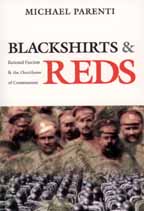 From the
Michael Parenti Political Archives:
From the
Michael Parenti Political Archives:
Blackshirts and Reds explores some of the big issues of our time: fascism, capitalism, communism, revolution, democracy and ecology — terms often bandied about but seldom explored in the original and exciting way that has become Michael Parenti’s trademark.
Parenti shows how “rational fascism” renders service to capitalism, how corporate power undermines democracy, and how revolutions are a mass empowerment against the forces of exploitative privilege. He also maps out the external and internal forces that destroyed communism, and the disastrous impact of the “free-market” victory on Eastern Europe and the former Soviet Union. He affirms the relevance of taboo ideologies like Marxism, demonstrating the importance of class analysis in understanding political realities and dealing with the ongoing collusion between ecology and global corporatism.
Written with lucid and compelling style, this book goes beyond truncated modes of thought, inviting us to entertain iconoclastic views, and to ask why things are the way they are. It is a bold and entertaining exploration of the epic struggles of yesterday and today.
Contents
Fascism historically has been used to secure the interests of large capitalist interests against the demands of popular democracy. Then and now, fascism has made irrational mass appeals in order to secure the rational ends of class domination.
- Plutocrats Choose Autocrats
- Whom Did the Fascists Support?
- Kudos for Benito and Adolph
- The Rational Use of Irrational Ideology
- Patriarchy and Pseudo-Revolution
- Friendly to Fascism
2. Let Us Now Praise Revolutions
Revolutions are democratic developments that expand the freedoms of people who enjoyed no freedom under oppressive pre-revolutionary regimes. Revolutions are a mass empowerment against the forces of exploitative privilege. They bring a dramatic reduction in political and economic oppression.
- The Costs of Counterrevolution
- Presumptions of Power
- Whose Violence?
- Free Market for the Few
- The Freedom of Revolution
- What Measure of Pain?
3. Left Anticommunism
Like conservatives and reactionaries, most of the U.S. Left greeted communism in the Soviet Union and Eastern Europe with fear and loathing, and with idealized expectations that took no account of Western encirclement and the survival necessities of socialism under siege.
- Genuflecting to Orthodoxy
- Pure Socialism vs. Siege Socialism
- Decentralization vs. Survival
4. Communism in Wonderland
The internal irrationalities and weaknesses of past communist economies and the systemic reasons why productivity stagnated and reforms were so difficult to effect.
- Rewarding Inefficiency
- Nobody Minding the Store
- Wanting It All
- Reactionism to the Surface
- Romanticizing Capitalism
5. Stalin’s Fingers
Newly published documentation on the gulag reveals a somewhat different picture of the repressive nature of communist systems, both in the past and in recent times. The historic accomplishments in economic development within communist countries represented a positive gain in the lives of hundreds of millions.
- How Many Victims?
- Where Did the Gulag Go?
- Memories of Maldevelopment
6. The Free-Market Paradise Goes East (I)
Repression by conservative forces in the former communist states in the name of “democratic reform”. Privileges from pre-communist days restored to the old owning classes. Western investors plunder the public sector at great profit to themselves, reducing the former communist countries to Third World levels.
- Suppression of the Left
- One-Way Democracy
- Must We Adore Vaclev Havel?
- Colonizing the East
7. The Free-Market Paradise Goes East (II)
The emergence of free market rapacity and growing inequality, widespread crime, social maladies, and victimization, especially of women, children, the elderly, and the poor. The Third Worldization and cultural decay of formerly collectivist societies.
- For Vipers and Bloodsuckers
- Shock Therapy for the Many
- Crime and Corruption
- Cultural Decay
- Women and Children Last
- “We Didn’t Realize What We Had”
8. The End of Marxism?
Understanding the fundamental concepts and discoveries of a view of society and politics that today is more relevant than ever, helping us to overcome truncated modes of thought, teaching us to ask why things are as they are.
- Some Durable Basics
- More Right than Wrong
- A Holistic Science
- Compartmentalized Ideology
- Learning to Ask Why
9. Anything But Class: Voiding the C-Word
Class power as more than a demographic category. Anything-but-class explanations of social realities that invite us to deny the obvious links between wealth and power and the collision of ecology with capitalism.
- The Class Denial of Class
- The ABC Theorists
- Everyday Class Struggle
- A Disappearing Working Class?
- Wealth and Power
- Eco-Apocalypse, a Class Act
Related page:
An Appeal to All Working People
This is the September 1996 election statement of the Socialist Equality Party (SEP), and it’s every bit as relevant today as it was then. Although the SEP is a Marxist party, and thus hampered by the conceptual limitations of scientific materialism, this election statement is nevertheless the best primer I’ve found so far on the political, economic and moral ideals of international socialism.
About the Author
 Michael Parenti received his Ph.D. in political science from Yale University in 1962. He has taught at a number of colleges and universities, in the United States and abroad. His writings have been translated into Portuguese, Japanese, Spanish, Chinese, Turkish, Polish, German, Bangla, and Dutch.
Michael Parenti received his Ph.D. in political science from Yale University in 1962. He has taught at a number of colleges and universities, in the United States and abroad. His writings have been translated into Portuguese, Japanese, Spanish, Chinese, Turkish, Polish, German, Bangla, and Dutch.
He is the author of fourteen books (see below). His articles have appeared in CovertAction Quarterly; Monthly Review; Prevailing Winds; The Humanist; New Political Science; Nature, Society and Thought; The Nation; Z Magazine; Dollars and Sense and numerous other publications.
He appears on radio and television talk shows to discuss current issues and ideas from his published works. Dr. Parenti’s talks and commentaries are played on radio stations to enthusiastic audiences in the U.S., Canada and abroad.
He lectures on college campuses and before a wide range of audiences across the country. His books are enjoyed by both lay readers and scholars, and have been used extensively in college courses.
Among the many topics he treats are:
- Democracy and Economic Power
- Imperialism and U.S. Interventionism
- Political Bias in the U.S. News Media
- Ideology and History
- Race, Gender, and Class
- The Overthrow of Communism
- Fascism: Past and Present
See also:
Articles & Selections from Published Works of Dr. Parenti http://www.michaelparenti.org/articles.html
A brief, unauthorized history of politically motivated faculty firings at the University of Vermont since 1972
http://www.uvm.edu/~radphil/uvmfirings.htm
Professor Will Miller’s Introduction for Dr. Michael Parenti before an overflow audience on the occasion of the 25th Anniversary of his firing by the UVM Trustees.
Books by Michael Parenti
-
To Kill a Nation: The Attack on Yugoslavia, 2001; Reveals a decade-long disinformation campaign waged by Western leaders and NATO officials in their pursuit of free-market “reforms”. The political and economic destabilization of Yugoslavia continues today, Parenti shows, as does the forced privatization and Third Worldization of the entire region.
-
History as Mystery, 1999; how history is manufactured and distorted by the victors, from early Christianity to today.
-
America Besieged,
1998.
-
Blackshirts and Reds: Rational Fascism and the Overthrow of Communism, 1997.
-
Dirty Truths, 1996; selected readings on politics, ideology, media, conspiracy, ethnic life, and class power.
-
Against Empire, 1995; critiques U.S. imperialism and the New World Order at home and abroad.
-
Democracy for the Few, 1995; now in its sixth edition, a critical study of the U.S. political system.
-
Inventing Reality: The Politics of News Media, 1993; now in its second edition, the first comprehensive critique of the news media.
-
The Sword and the Dollar: Imperialism, Revolution, and the Arms Race, 1989; an exposé of U.S. cold war history and interventionism in the Third World.
-
Make-Believe Media, 1992; the hidden politics of the entertainment media.
-
Land of Idols: Political Mythology in America, 1994; challenges many of the deceptions put forth by conservative elites.
- Power and the Powerless, 1978
Reviews
“America’s foremost progressive writer and speaker, Parenti is illuminating, penetrating, and never afraid of the truth.”
— James Petras
SUNY professor and noted author
“Radical in the true sense of the word, [Parenti] digs at the roots which...sustain our public consciousness.”
Los Angeles Times Book Review
Related books
The Mass Psychology of Fascism
by
Wilhelm Reich
1933
The Beast Reawakens
by Martin A. Lee
Body of Secrets:
Anatomy of the Ultra-Secret National Security Agency
by James Bamford
In 1962, fascist U.S. military leaders had a top-secret plan for committing terrorist attacks on Americans in Miami and Washington D.C., while blaming Cuba. Codenamed “Operation Northwoods”, the plan was intended to provide the propaganda necessary to create popular support for an invasion of Cuba.
What Uncle Sam Really Wants
by Noam Chomsky
Rogue State:
A Guide to the World’s Only Superpower
by William Blum
Killing Hope:
U.S. Military and CIA Interventions Since WWII
by William Blum
Hidden Agenda:
U.S./NATO Takeover of Yugoslavia
by Ramsey Clark, Nadja Tesich, Michel Chossudovsky, Slobodan Milosevic, numerous authors
NATO in the Balkans:
Voices of Opposition
by Ramsey Clark, Nadja Tesich, Sean Gervasi, Sara Flounders, Thomas Deichmann, Gary Wilson and Richard Becker
NATO TARGETS
(video)
produced by Gloria La Riva
Pirates and Emperors, Old and New:
International Terrorism in the Real World
by Noam Chomsky
The Real Terror Network:
Terrorism in Fact and Propaganda
by Edward S. Herman
Western State Terrorism
Alexander George, editor; essays by Noam Chomsky, Edward S. Herman, Gerry O’Sullivan and others
Terrorizing the Neighborhood:
American Foreign Policy in the Post-Cold War Era
by Noam Chomsky
Pressure Drop Press, 1991
The Fire This Time:
U.S. War Crimes in the Gulf
by Ramsey Clark
Desert Slaughter:
The Imperialist War Against Iraq
by the Workers League
The Culture of Terrorism
by Noam Chomsky
The Phoenix Program
by Douglas Valentine
Against Empire
by Michael Parenti
Apocalypse 1945:
The Destruction of Dresden
by David Irving
Saving Private Power:
The Hidden History of “The Good War”
by Michael Zezima
Market Elections:
How “Democracy” Serves the Rich
by Vince Copeland
Corporate Predators:
The Hunt for Mega-Profits and the Attack on Democracy
by Russell Mokhiber and Robert Weissman
Derailing Democracy:
The America the Media Don’t Want You to See
by David McGowan
A People’s History of the United States:
1492 — Present
by Howard Zinn
Censored 2000:
The Year’s Top 25 Censored Stories
by Peter Phillips & Project Censored
Deadly Deceits:
My 25 years in the CIA
by Ralph W. McGehee
Globalize This!
The Battle Against the World Trade Organization and Corporate Rule
edited by Kevin Danaher and Roger Burbach; multiple authors
Lies My Teacher Told Me:
Everything Your American History Textbook Got Wrong
by James Loewen
The American Presidency
by Gore Vidal
The Habits of Highly Deceptive Media:
Decoding Spin and Lies in Mainstream News
by Norman Solomon
Corporate Media and the Threat to Democracy
by Robert W. McChesney
Toxic Sludge is Good for You!:
Lies, Damn Lies and the Public Relations Industry
by John Stauber and Sheldon Rampton